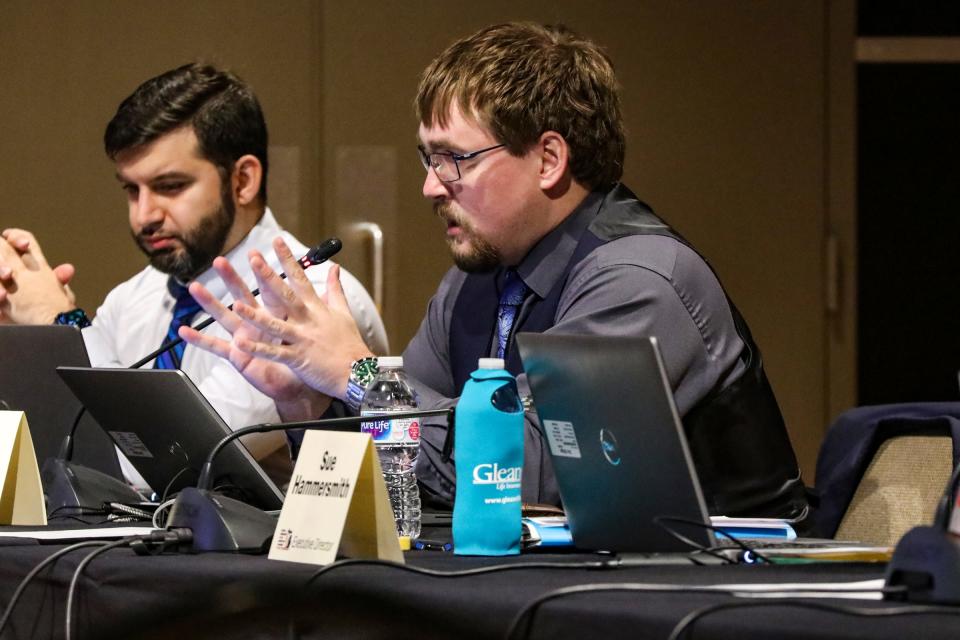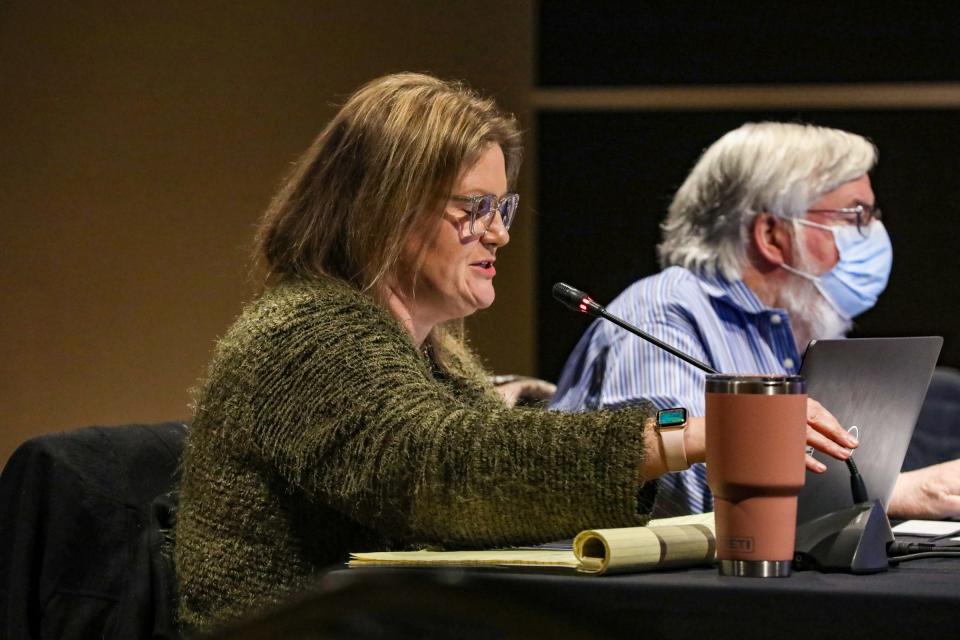Michigan's redistricting commission adopts final congressional map

West Michigan voters will have some interesting choices to make the next time they vote for their U.S. congressional representative.
Michigan’s redistricting commission voted to adopt new congressional districts Tuesday, creating political boundaries for the state's 13 U.S. House districts for the next decade.
The new map places the current hometowns of eight incumbents in the same districts, eliminates the two majority-Black districts that currently run through Detroit and chips away at the Republican advantage baked into the map in place today.
The new map was backed by eight out of 13 of the randomly selected voters who serve on the commission, including two Democrats, two Republicans and four independents. Five commissioners voted for a different plan.
U.S. Reps. Bill Huizenga, R-Holland Township, and Fred Upton, St. Joseph, now reside in a new West Michigan lakeshore district, and Upton — who has been in office since 1987 — has said he doesn't plan to move, though it's unclear if he expects to run for another term.
Huizenga's current district currently stretches from the top half of Allegan County and stretches north into Benzie County. The district covers much of Lake Michigan's western shore and many of Grand Rapids's suburbs and exurbs, including Muskegon, Holland, Kentwood and Grand Haven.

Upton's current district is based in Kalamazoo and stretches along the Michigan-Indiana border in the southwestern part of the state.
Under the new map configuration, District 3 (currently based in Grand Rapids) would now extend west to include Muskegon and Grand Haven, while a new District 4 would start in St. Joseph Township and extend north to Port Sheldon Township.
Huizenga announced via Twitter he plans to run for election in the new district: "The Michigan Redistricting Commission has spoken. I was born and raised in Ottawa County and I will proudly run to represent the voters in the newly created 4th Congressional District."
The Michigan Redistricting Commission has spoken. I was born and raised in Ottawa County and I will proudly run to represent the voters in the newly created 4th Congressional District. (1/2)
— Bill Huizenga (@billhuizenga) December 29, 2021
U.S. Rep. Peter Meijer, R-Grand Rapids, tweeted Tuesday afternoon that he would run for reelection in District 3.
"Michigan's new Third Congressional District, including my hometown of Grand Rapids, represents many Kent County communities in our current district, while also adding Grand River & lakeshore communities with shared interests in clean water and conservation," Meijer tweeted. "I'm running for re-election to represent these amazing West Michigan communities in Congress."
Michigan's new Third Congressional District, including my hometown of Grand Rapids, represents many Kent County communities in our current district, while also adding Grand River & lakeshore communities with shared interests in clean water and conservation. (1/2)
— Peter Meijer (@VoteMeijer) December 28, 2021
Ionia County, which is currently in District 3, would transition to District 2 — covering a plethora of counties in mid-Michigan. Notable cities in the district include Ludington, Big Rapids and Mount Pleasant.

And that's just the start of the jockeying, with the election season expected to begin in earnest now that the district lines have been set.
The commission was supposed to adopt new districts by Nov. 1, but the group moved forward with its own self-imposed schedule following a monthslong delay in the census data used to draw voting districts.
The delay has scrambled political calculations heading into 2022, and the prospect of legal challenges against the commission’s maps could create new uncertainties for candidates trying to determine where to run for office.
The commission’s vote marks the culmination of a monthslong process during which the political novices who make up the commission toured the state to seek public feedback on what the lines should look like and spent marathon meetings working together to draw new maps.
It also marks a pivotal moment for the new citizen-led redistricting process Michigan voters sought in 2018 when they adopted a constitutional amendment to remove redistricting responsibilities from state lawmakers and place them in the hands of the citizen-led commission charged with drawing fair maps based on community input.

Michigan's new congressional map
Michigan’s congressional delegation today is evenly divided between the two major parties, with seven Democratic and seven Republican representatives.
But the new map for the delegation that will be elected in November 2022, sets up one party to win a majority of seats. Michigan lost a congressional district for the fifth consecutive decade after the state recorded the second slowest population growth in the country over the past 10 years.
According to three measures of partisan fairness based on statewide election data from the past decade, the map favors Republicans. But those measures also show a significant reduction in the Republican bias in the map drawn a decade ago by a Republican legislature, deemed one of the most politically biased maps in the country. One of the partisan fairness measures used by the commission indicates Democratic candidates would have an advantage under the new map.
It's also of note that populations and voting trends change, sometimes drastically, over the course of a decade. The map drawn by the legislature in 2011 was supposed to feature nine safe Republican districts. In 2018, two of those nine were won by Stevens and Slotkin.
Politicians from metro Detroit have raised concerns about the elimination of the two majority-Black districts that run through Detroit. And on Tuesday, the chair of the 13th Congressional District Democratic Party Organization threatened a lawsuit against the commission alleging that the map disenfranchises Black voters.
The commission's voting rights attorney Bruce Adelson has argued that the districts drawn by the commission comply with the Voting Rights Act, the federal law that prohibits racially discriminatory districts that deny minority voters an opportunity to elect their preferred candidates.
9038254002
- Embed
- Not set
- GM 1 MI
- Not set
- 12/28/21 4:28:32 PM
- Not embargoed
embed:
Return to Asset Tab
SEO Warning
Layout Priority
The new congressional map creates the following 13 districts:
District 1, an Up North district: This district includes all of Michigan's Upper Peninsula and much of the northern Lower Peninsula. Rep. Jack Bergman, R-Watersmeet, currently lives in this safe Republican district.
District 2, a mid-Michigan district: This district encompasses many mid-Michigan counties. This would be a safe Republican seat.
District 3, a Grand Rapids-based district: This district pairs Grand Rapids with some communities on the western lakeshore, including Grand Haven and Muskegon. The district would be politically competitive. Rep. Peter Meijer, R-Grand Rapids, currently lives in this district.
District 4, a western lakeshore district: The district starts in St. Joseph Township and extends north to Port Sheldon Township. The district includes Battle Creek and Kalamazoo. Reps. Bill Huizenga, R-Holland Township, and Fred Upton, St. Joseph, currently live in this solidly Republican district.
District 5, a southern border district: The district spans Michigan’s entire southern border and includes all of Jackson County along with portions of Calhoun and Kalamazoo counties. Rep. Tim Walberg, R-Tipton, currently lives in this safe Republican district.
District 6, an Ann Arbor-based district: This safe Democratic district places Ann Arbor and Ypsilanti with some of western Wayne County, including Canton and Plymouth, as well as parts of Downriver and Novi.
District 7, a Lansing-based district: This district includes all of Clinton, Ingham, Livingston and Shiawassee counties. Rep. Elissa Slotkin, D-Holly — who currently represents Lansing — is reportedly eyeing a run in this toss-up district.
District 8, a Flint-based district: Bay City, Flint and Saginaw are currently in the same congressional district, but this district would add Midland to the mix to include the hometowns of Rep. Dan Kildee, D-Flint Township, and Rep. John Moolenaar, R-Midland. As drawn, it appears to be a safe Democratic seat but the district has trended Republican in recent elections.
District 9, a Thumb district: This district includes much of Michigan's Thumb, encompassing Huron, Lapeer, Sanilac and St. Clair counties along with portions of northern Oakland and Macomb counties. Rep. Lisa McClain, R-Bruce Township, and Rep. Elissa Slotkin, D-Holly, currently live in this district. This district would be a safe Republican district.
District 10, a southern Macomb County district: This district includes southern Macomb County communities Utica, Sterling Heights, Center Line, Warren, Eastpointe, Clinton Township, Mt. Clemens, St. Clair Shores and pairs them with Oakland County’s Rochester and Rochester Hills. The politically competitive district includes the hometown of Rep. Haley Stevens, D-Rochester Hills.
District 11, a southern Oakland County district: This solidly Democratic district includes southeast Oakland County communities Ferndale, Oak Park, Royal Oak, Madison Heights and extends up to Troy. It also includes Bloomfield Hills, Pontiac, Farmington, Farmington Hills, Walled Lake, Wixom, Commerce Charter Township and Waterford. Rep. Andy Levin, D-Bloomfield Township, currently lives in this district.
District 12, a western Wayne County district: This safe Democratic district pairs Dearborn, Livonia, Westland and Redford in western Wayne County with Oakland County’s Southfield. It includes some west side Detroit neighborhoods and places Rep. Brenda Lawrence, D-Southfield, and Rep. Debbie Dingell, D-Dearborn, in the same district.
District 13, a Detroit-based district: This district encompasses most of Detroit and extends downriver to include Wyandotte, Southgate, Allen Park, Taylor and Romulus. Rep. Rashida Tlaib, D-Detroit, currently lives in this safe Democratic district.

What happens next?
The commission will vote to adopt new state legislative districts next.
Under the Michigan Constitution, the commission must publish the map along with data and reference materials used to draw it within 30 days after adopting it. The map becomes law 60 days after its publication.
Democratic and Republican candidates for U.S. House and the Michigan Legislature must file petitions to run for office by late April to make it onto the August 2022 primary ballot.
While candidates across the state begin collecting signatures, election officials will be working under a truncated schedule to update voter registration records to assign voters to their new districts.
Possible legal challenges to the maps threaten to compress those timelines further as courts weigh allegations against the commission’s work.
— Clara Hendrickson fact-checks Michigan issues and politics as a corps member with Report for America, an initiative of The GroundTruth Project. Contact her at chendrickson@freepress.com or 313-296-5743. Follow her on Twitter @clarajanehen.
This article originally appeared on The Holland Sentinel: West Michigan will see big changes in new congressional map

